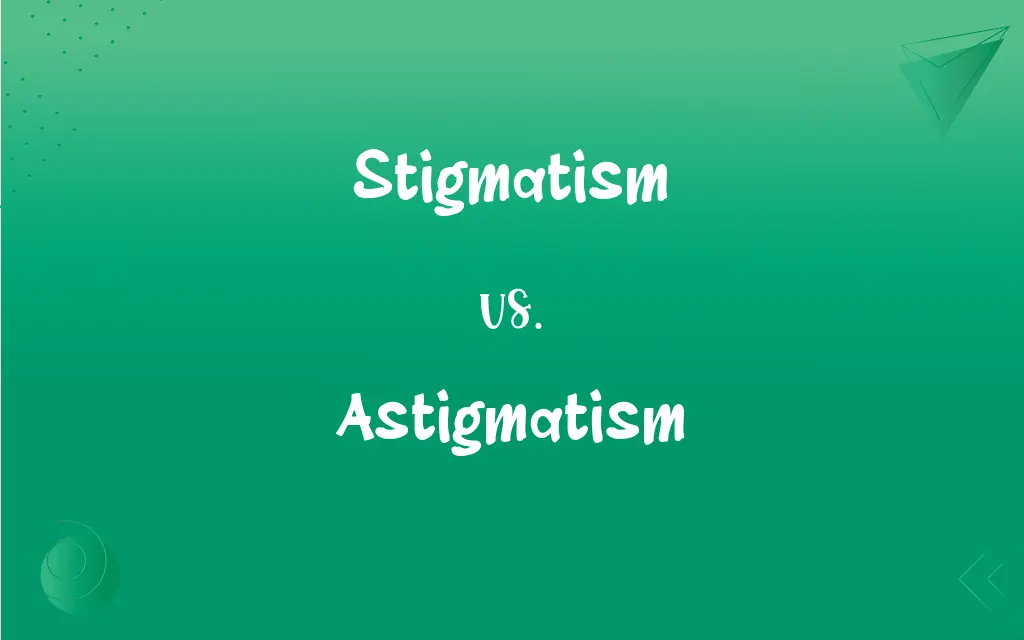Stigmatism vs. Astigmatism: What's the Difference?
Edited by Harlon Moss || By Janet White || Updated on October 11, 2023
Stigmatism isn't a recognized term in optometry, while Astigmatism refers to an imperfection in the eye’s curvature, causing blurred or distorted vision.

Key Differences
Stigmatism is not a standard term used in the field of optometry or medicine. While one might hear it from time to time in casual conversation, it might be a mispronunciation or a misunderstanding of the term "astigmatism." It's crucial to distinguish between actual medical terminology and words that might have entered the layperson's lexicon incorrectly. As such, stigmatism doesn't have a defined meaning in a medical or eye health context and doesn’t describe any recognized condition of the eye.
Astigmatism, on the other hand, is a common and generally well-understood condition related to the eye's curvature. When the cornea or lens has an irregular shape, it prevents light from focusing properly on the retina, the light-sensitive surface at the back of the eye. Astigmatism can cause images and lights to appear blurred or stretched out, and might be present at birth, or can develop over time. It’s a condition that can often be corrected or managed with glasses, contact lenses, or surgery.
In conversations about eye health, clarity in the terminology used is essential to avoid confusion. The misuse of "stigmatism" when one means "astigmatism" might lead to miscommunications, especially in medical consultations or when discussing vision problems. There are no medical definitions, symptoms, or treatments associated with stigmatism simply because it is not recognized in a professional context.
Astigmatism’s recognition as a common vision problem reinforces the necessity of understanding the term accurately. Various forms of astigmatism exist, such as myopic astigmatism (nearsightedness), hyperopic astigmatism (farsightedness), and mixed astigmatism (a combination of both). Each variant describes an instance where light doesn’t focus evenly onto the retina, resulting in distorted or blurred vision, and each type has methods of diagnosis and pathways for management or correction.
Comparison Chart
Recognition
Not recognized
Widely recognized
ADVERTISEMENT
Definition
No clear definition
Refers to irregular curvature of the eye
Medical Relevance
None
Significant
Treatment
Not applicable
Glasses, contacts, or surgery
Symptoms
None
Blurred or distorted vision
Stigmatism and Astigmatism Definitions
Stigmatism
A misinterpretation or misconception often confused with "stigma," relating to a mark of disgrace.
Many people mistakenly use the term 'stigmatism' when referring to the social stigma associated with certain conditions.
ADVERTISEMENT
Astigmatism
Astigmatism involves an uneven curvature of the eye's cornea or lens.
My blurred vision was diagnosed as astigmatism by the optometrist.
Stigmatism
An astigmatic condition or effect.
The telescope suffered from stigmatism, causing the stars to look slightly skewed.
Astigmatism
Astigmatism may coexist with other refractive errors like myopia and hyperopia.
I wear glasses that correct both my astigmatism and my myopia.
Stigmatism
A deviation from spherical curvature in an eye's lens leading to distorted vision.
She had to get corrective lenses to address the stigmatism affecting her eyesight.
Astigmatism
Astigmatism can cause difficulties in seeing fine details, both close-up and from a distance.
Reading books and road signs became a struggle due to my astigmatism.
Stigmatism
A defect in a lens or optical system causing rays from a point to not converge at a single focus.
Because of the stigmatism in her camera lens, the photo had noticeable blurring.
Astigmatism
Astigmatism can be congenital or develop over time due to eye stress or injuries.
His astigmatism developed gradually, not from birth, but from excessive reading in poor light.
Stigmatism
The property of light waves having different focal lengths in different planes.
When analyzing the beam's propagation, the scientist noticed stigmatism affecting the wavefronts.
Astigmatism
Astigmatism is often correctable with prescription lenses, contacts, or sometimes surgery.
Laser surgery can be an option to correct astigmatism permanently.
Stigmatism
The condition of being affected by stigmata.
Astigmatism
A visual defect in which the unequal curvature of one or more refractive surfaces of the eye, usually the cornea, prevents light rays from focusing clearly at one point on the retina, resulting in blurred vision.
Stigmatism
The state of a refracting or reflecting system in which light rays from a single point are accurately focused at another point.
Astigmatism
(optics) A defect of a lens such that light rays coming from a point do not meet at a focal point so that the image is blurred.
Stigmatism
Normal eyesight.
Astigmatism
(pathology) A disorder of the vision, usually due to a misshapen cornea, such that light does not focus correctly on the retina causing a blurred image.
Stigmatism
(optics) Image-formation property of an optical system which focuses a single point source in object space into a single point in image space
Astigmatism
A defect of the eye or of a lens, in consequence of which the rays derived from one point are not brought to a single focal point, thus causing imperfect images or indistinctness of vision.
Stigmatism
(medicine) Normal eyesight, anastigmatic state
Astigmatism
(ophthalmology) impaired eyesight resulting usually from irregular conformation of the cornea
Stigmatism
(pathology) State of having stigmata
Astigmatism
(optics) defect in an optical system in which light rays from a single point fail to converge in a single focal point
Stigmatism
The condition of having or being marked by stigmata
Stigmatism
(optics) condition of an optical system (as a lens) in which light rays from a single point converge in a single focal point
Stigmatism
Normal eyesight
FAQs
Can Astigmatism be corrected?
Yes, Astigmatism can typically be corrected with eyeglasses, contact lenses, or surgery.
Is Stigmatism a correct term in relation to eye conditions?
No, "Stigmatism" is often mistakenly used, but the correct term when referring to the eye condition is "Astigmatism."
How is Astigmatism diagnosed?
Astigmatism is usually diagnosed through an eye exam, utilizing tools like a phoropter and retinoscope.
Can Stigmatism and Astigmatism be used interchangeably?
No, because "Stigmatism" isn’t the correct term for the eye condition. Only "Astigmatism" should be used in that context.
Is Stigmatism a legitimate word in any context?
While "Stigmatism" is not recognized in eye care, it may be confused with “stigma” which pertains to a mark of disgrace.
Is there a social context where Stigmatism is used properly?
Not typically. "Stigmatism" seems to be a misusage or typo in most contexts and is not standard.
Can Astigmatism lead to other eye issues?
Astigmatism mainly affects clarity of vision but isn’t typically associated with causing additional eye issues.
What are the treatments available for Astigmatism?
Astigmatism is typically treated with corrective lenses or refractive surgery.
What does Astigmatism mean?
Astigmatism is a common vision condition that causes blurred vision due to an irregular shape of the cornea or lens.
What causes Astigmatism?
Astigmatism is usually caused by an irregularly shaped cornea or lens, which can be present at birth or develop over time.
What symptoms are associated with Astigmatism?
Common symptoms include blurred or distorted vision, eye strain, and sometimes headaches.
Is Astigmatism hereditary?
Yes, Astigmatism can run in families and has a genetic component.
What's the etymology of Astigmatism?
Astigmatism derives from the Greek words "a" (without) and "stigma" (a point).
Is Stigmatism recognized in any English dictionary?
"Stigmatism" is not commonly recognized as a standard English word and might be considered a mispronunciation or misspelling.
Can Astigmatism be present at birth?
Yes, Astigmatism can be congenital, meaning present from birth.
Do people often use Stigmatism when they mean Astigmatism?
Yes, "Stigmatism" is sometimes incorrectly used in place of "Astigmatism" in informal communication.
Can Astigmatism worsen over time?
Yes, Astigmatism can change with age and may worsen or sometimes improve.
Is Astigmatism a rare condition?
No, Astigmatism is quite common and can be found in varying degrees in many individuals.
Are there preventive measures for Astigmatism?
No definitive preventive measures for Astigmatism exist as it's often hereditary or develops due to unknown causes.
Can you have Astigmatism in both eyes?
Yes, Astigmatism can occur in one eye only or in both eyes.
About Author
Written by
Janet WhiteJanet White has been an esteemed writer and blogger for Difference Wiki. Holding a Master's degree in Science and Medical Journalism from the prestigious Boston University, she has consistently demonstrated her expertise and passion for her field. When she's not immersed in her work, Janet relishes her time exercising, delving into a good book, and cherishing moments with friends and family.
Edited by
Harlon MossHarlon is a seasoned quality moderator and accomplished content writer for Difference Wiki. An alumnus of the prestigious University of California, he earned his degree in Computer Science. Leveraging his academic background, Harlon brings a meticulous and informed perspective to his work, ensuring content accuracy and excellence.
































































